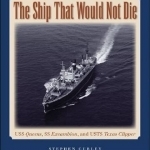The Ship That Would Not Die: USS Queens, SS Excambion and USTS Texas Clipper
BookThis item doesn’t have any media yet
2011 | History & Politics
Starting its life as an attack transport in World War II-and one of the last five left afloat by war's end-the USS Queens saw action at Iwo Jima and other hot spots in the Pacific theater. After the war, the ship became the SS Excambion , one of the "Four Aces" of American Export Lines: the only fully air-conditioned ships in the world at the time. In 1965, the versatile Excambion underwent yet another transformation-into a floating classroom. Recommissioned as the USTS Texas Clipper , the ship began a third life as a merchant marine training vessel with its home port in Galveston. For the next three decades the Texas Clipper would be home to merchant marine cadets, and by the time it was retired in 1996, it was the oldest active ship in the U.S. merchant marine fleet. Finally, the Texas Clipper , after protracted bureaucratic wrangling, was designated to be sunk in the Gulf of Mexico as an artificial reef to provide habitat for marine life. In 2007, the ship was towed to its final resting place, seventeen nautical miles off the coast of South Padre Island. Now, 136 feet below the surface, the venerable Texas Clipper lives on as the home to a wide variety of underwater species.
Filled not only with meticulously researched technical and historical data about the ship's construction, service record, crew procedures, and voyages, The Ship That Would Not Die also features lively anecdotes from crew members, passengers, and officers. More than 140 color and black-and-white photos illustrate the ship's construction, its wide variety of shipboard life, the exacting process of making the Texas Clipper ready to become an artificial reef, and its final sinking in the Gulf of Mexico.
Related Items:
| Published by | Texas A & M University Press |
| Edition | Unknown |
| ISBN | 9781603444279 |
| Language | N/A |
Images And Data Courtesy Of: Texas A & M University Press.
This content (including text, images, videos and other media) is published and used in accordance
with Fair Use.
